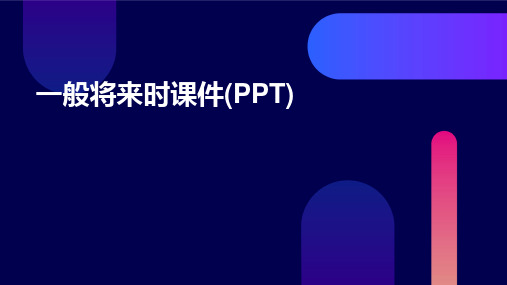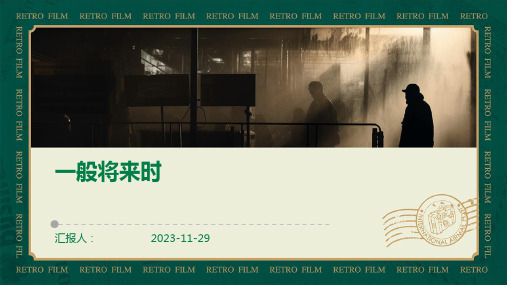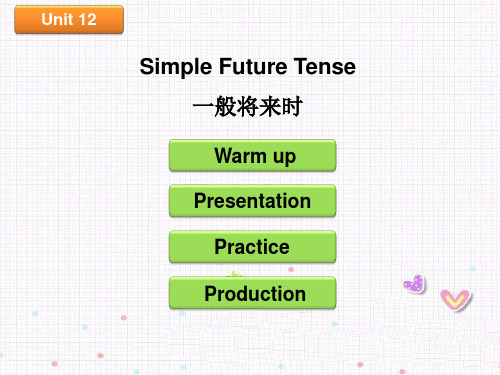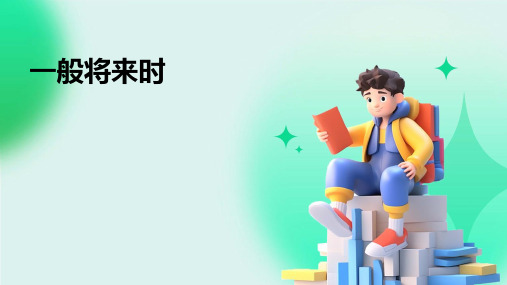一般将来时 PPT课件
一般将来时课件(PPT)

“be able to”表示将来有能力做某 事时,使用一般将来时形式,例如“I will be able to help you”。
情态动词如“can”、“may”、 “must”等,在一般将来时中通常直 接加动词原形,例如“I can swim”。
03
一般将来时在句子中的运用
陈述句中的使用
表示将要发生的动作或存在的状态
纠正方法
应使用正确的将来时形式,如 "He will go to the park tomorrow." 或 "He is going to the park tomorrow."
忽略动词变化规则
错误示例
They will play football in the future.(忽略了动词play在将来时中的变化)
纠正方法
在将来时中,应使用正确的助动词或情态动词形式,如 "I will be able to help you with your homework." 或 "I can help you with your homework."
错误示例
He will must finish his work before leaving.(错误地使 用了情态动词must)
作用
用于表示未来的计划、打算、预测、 假设等。
常见表达形式
will + 动词原形
表示将来的动作或状态,如“I will go to the park tomorrow.”(我明天将去公园。)
be going to + 动词原形
表示计划、打算或即将发生的动作,如“I am going to study hard this semester.”(我这 学期打算努力学习。)
一般将来时PPT课件

•一般将来时基本概念•一般将来时结构与用法•一般将来时时间状语及标志词•一般将来时与其他时态对比•一般将来时在各类从句中运用•一般将来时误区及注意事项•总结回顾与拓展延伸目录01一般将来时基本概念定义与特点定义特点表现形式will + 动词原形be going to + 动词原形现在进行时表示将来预测未来计划与安排条件与假设030201使用场景02一般将来时结构与用法主语+ be not going to + 动词原形+ 其他成分主语+ be to not (非标准用法,尽量避免使用) + 动词原形+ 其他成分主语+ will not (won't) + 动词原形+ 其他成分Will + 主语+ 动词原形+ 其他成分?Be + 主语+ going to + 动词原形+ 其他成分?Be + 主语+ to + 动词原形+其他成分?(较少使用,多用于书面语)特殊疑问词动词原形特殊疑问词going to +成分?特殊疑问词to +(较少使用,多用于书面语)注意:在一般将来时的使用中,要注意区分不同语境和表达方式的细微差别,选择合适的结构进行表达。
同时,也要注意与其他时态的区分和联系,避免混淆使用。
特殊疑问句结构03一般将来时时间状语及标志词常见时间状语表示将来的时间状语表示计划或安排的时间状语标志词识别与运用04一般将来时与其他时态对比与现在进行时对比时间指向不同01动词形式差异02使用情境不同03时间基准差异动词形式变化使用情境区别时间范围不同动词形式区别使用情境差异05一般将来时在各类从句中运用在宾语从句中运用01 02定语从句的时态取决于它所修饰的先行词,如果先行词是将来时态,定语从句也使用将来时态。
如果先行词是过去将来时,定语从句则使用过去将来时。
定语从句中表示将来的时间状语有:tomorrow, next year, in the future 等。
06一般将来时误区及注意事项误区二过度使用“will”和“going to”。
一般将来时课件ppt(共17张PPT)

Jim going to
afternoon?
in the playground tomorrow
4. .Jim is going to play football in the playground tomorrow afternoon.
Jim going to play football tomorrow afternoon?
2)在浊辅音和元音后读/d/.
一般过去时, 要用动词过去式. Jim is going to play football in the playground tomorrow afternoon.
Jim is going to play football in the playground tomorrow afternoon. ⑵are变为were。
there were many beautiful flowers there. 一般将来时表示将来某个时间要发生的动作或存在的状态常与表示将来的时间状语连用
⑴am ,is变为was。
So she They to read some books.
What did they do in the park? 1)在清辅音后读/t/ .
(3).动词过去式变化规则
a)一般情况下,直接加ed.如:wash--washed, look---looked; b)以不发音字母e结尾的,加d.如:like---
liked, dance---danced; c)以“辅音字母+y”结尾的,变y为i再加ed. 如:study---studied;
food and (play) lots of games. They
(come) home at 4:30.
一般将来时(9张PPT)初中英语专项复习课件

will句式总结:
肯定
否定
一般疑问
回答
I will have
I won`t have Will I have
Yes,I will.
many presents. many presents. many presents? No,I won`t.
He will travel He won`t travel Will he travel Yes, he will.
to Beijing.
to Beijing.
to Beijing?
No ,he won`t.
There will be fun in Xi`an.
There won`t be Will there be fun in Xi`an. fun in Xi`an.
Yes,there will. No,there won`t.
1、表示将来某一时刻的动作或状态: We will come to see you the day after tomorrow. There will be a wonderful show next week.
2、表示将来某一段时间内经常的动作或状态: The students will come and work in the lab once a week. We will come and work in this factory every year.
Some day people will go to the moon . 否定句:在will 的后面加not即可。will not 可缩写为 won’t
They won’t use books . 一般疑问句:把will 提到句子主语之前,结尾变问号。
一般将来时ppt课件

02 一般将来时的基本用法
表示将来要发生的行为
要点一
常见的助动词“will”和 “shall”可以用于表示将…
“I will go to the store tomorrow.”(我明天要去商店。 )
要点二
“be going to”也可以用于表达 将来要发生的行…
“It is going to rain later.”(待会儿要下雨了。)
肯定句
I am going to swim in the afternoon.
否定句
They are not going to watch the movie.
疑问句
Are you going to meet your friend tomorrow?
主语+be to+动词原形
肯定句
You are to hand in your homework tomorrow.
表示邀请或建议
总结词
表示邀请或建议某人做某事,通常用于 口语交流中。
VS
详细描述
在口语交流中,我们经常使用一般将来时 态来表示邀请或建议,例如:“Would you like to come to my house for dinner tomorrow?”(明天你想来我家 吃晚饭吗?)或者“Let's go for a walk after dinner.”(晚饭后我们去散步吧。 )
02
在一些情况下,我们也可以使用“be going to”来表达将来时
。例如
It is going to rain.(将要下雨了。)
03
构成
They are going to graduate next year.(他们将于明年毕业。)
初中英语 一般将来时课件(PPT18张)

Ⅳ.一般将来时的被动语态
一般将来时的被动语态表示“…将要被…”,其常用的表达形式有以下几种:
一般将来时被动语态:
will/shall + be /get done (表示意想不到的要发生的事情)
be going to be + done (表示按计划或安排发生的被动动作) be about to be + done (指将要发生的事情)
2.They ________ an English evening next Sunday. A. are having B. are going to have C. will having D. is going to have
3.—Tell him about the news when he _______, John.
考点2:考察一般将来时的不同表达方式
1.– Will his parents go to see the Terra Cotta Warriors tomorrow? – No, ________ (不去).
A. they willn’t. B. they won’t. C. they aren’t. D. they don’t.
基本结构:
1.主语+will/shall+do sth 2.主语+am/is/are+going to+do sth
3. 主表语示+位am移/is的/ar动e+词do可ing用s现th 在进行时表将来 4. 主特语定+时do间sth和条件状语从句可用一般将来时表将来
5.主语+am/is/are+(about)+to+do sth 注:之所以不用be是因为这是一般将来时,而be还包括过去式的 was、were
一般将来时PPT课件

05
解析
含有will的句子改为否定句时 ,在will后加not,缩写为 won't。
06
THANKS
感谢观看
06
一般将来时练习题精选与解析
选择题精选与解析
01
题目:I _______ to the cinema. Will you go with me?
02
A. go B. am going C. have gone D. went
选择题精选与解析
答案:B
解析:由后一句“Will you go with me?”可知是打算去做某事,是一般将来时,所以用现 在进行时表将来,选B。
题目:— What _______ you _______ to do tomorrow?
选择题精选与解析
— I _______ visit my uncle. A. are; going; am going B. are; going; am going to
C. are; going to; am going D. are; going to; am going to
区别
现在进行时强调当前正在进行的动作 或状态,而一般将来时则强调未来将 要发生的动作或状态。
联系
两者都可用于表示将来的情况,但侧 重点不同。现在进行时通过现在正在 进行的动作暗示将来,而一般将来时 则直接表达将来的动作或状态。
与过去将来时的区别与联系
区别
过去将来时表示从过去某一时间 看将要发生的动作或状态,而一 般将来时则是从现在看将来要发 生的动作或状态。
表示将来经常发生的动作或习惯
常用的时间状语
always, often, usually等 。
句子结构
一般将来时(8张PPT)初中英语专项复习课件

肯定句:主语+ will +do+其他 People will have robots in their homes. 否定句:主语+ will not /won't+do+其他 People will not/won’t have robots in their 一般疑问句:Will+主语+do+其他? 肯定回答:Yes, they will. 否定回答:No, they won’t. Will people have robots in their homes?
homes.
2.而be going to +do通常用来谈论在一个较近的未来将要发生的计 划中的或是有可能发生的事。如:
I am going to visit us next month.(在一个较近的未来将要发生 的计划中的事)
It is so cloudy. I think it’s going to rain. (有可能发生的事)
一般将来时
初中英语专项复习
一、一般将来时的意义: 用来描述一个即将要发生的动作;谈论未来的计划和打算。
二、一般将来时的基本结构: will/shall+动词原形
be going to+动词原形
常见时间状语:
next Tuesday next week the coming Sunday next year this afternoon
tomorrow tonight in a few minutes in the future in five years
三、一般将来时
1.will 用于一切人称,shall只用于第一人称(I/we)。但现代英语倾向 于所有人称都使用will而不用shall。will/shall + do通常用来谈论未 来会发生的事或是正在制定的计划。 It will rain this afternoon.(未来发生) I will take an umbrella with me.(计划)
《一般将来时》课件

be going to+动词原形
结构
主语+be going to+动词原形+其他 成分
例子
We are going to meet at the train station at 5:00.(我们计划在5点钟 在火车站见面。)
含义
表示计划或安排将来要发生的动作或 状态
用现在进行时表示
结构
主语+be+动词现在分词+ 其他成分
一般将来时可以用来表示对未来事件的预见或推测,通常与时间状语连用,如“in the future”、 “next year”等。例如,“It will rain tomorrow.”(明天会下雨。)
表示意图、打算或希望
总结词
表示个人的意图、打算或意图、打算或希望,通常与 表示意图的动词连用,如“plan”、“intend”、“hope” 等。例如,“I will visit my grandparents next week.”( 我打算下周去看望我的祖父母。)
含义
表示将来某个时间正在进 行的动作或状态
例子
He is coming here next week.(他下周将会来这 里。)
用一般现在时表示
结构
主语+动词原形+其他成分
含义
表示将来某个时间经常发生的动作或状态
例子
I do my homework every day.(我每天都会做作业。)
03
一般将来时的肯定句、否定句和 疑问句
感谢观看
基本构成
will + 动词原形
疑问句形式
Will + 主语 + 动词原形
否定句形式
一般将来时课件PPT.上课用

与“be going to + 动词原形”和“will + 动词原形”相比,“be about to + 动词原形”更强调即将发生的紧迫性。
04
一般将来时的否定形式
will not = won’t
01
"will not" 是 "will" 的否定形式 ,表示将来某个时间不会发生某 件事情。
明年这个时候我们将在巴黎度假。
表示未来的时间状语从句的连用
一旦你完成这个项目, 你就可以休息了。
即使明天下雨,我们 也会按时举行运动会。
只要他一回来,我们 就出发。
表示未来的时间状语从句的省略
明天见。 下周再见。
明天这个时候我们会在飞机上。
THANKS
主语 + will not + 动词原形 + 其他成分,例如:He will not come back until next month.(他下个月之前不会回来。)
Will + 主语 + 动词原形 + 其他成分,例如:Will you be available this afternoon?(你今天下午有空吗?)
表示预测和推测
总结词
一般将来时也可以用来表示对未来的预测和推测,通常基于 某种事实或证据。
详细描述
当我们根据已知事实或证据推断某件事情将在未来发生时, 可以使用一般将来时。例如,“根据天气预报,明天会下雨 ”表示对天气的预测,“根据市场趋势,明年房价可能会上 涨”表示对未来的推测。
表示意愿和打算
05
一般将来时的疑问形式
will + 主语 + 动词原形?
总结词
小学英语语法课件- 一般将来时 (共36张PPT) 全国通用

Presentation Sentences
She will take swimming lessons in this vacation. 她今年假期要去学游泳。 She is going to go shopping tomorrow. 她明天要去购物。 Jim will open a shop on internet. 吉姆打算要在网络上开个店。 Jim is going to be an actor when he grows up. Jim长大了想当一名演员。
___t_o_m_o_r_ro_w_.____________________________ 一般疑问句:A__re_t_h_e_c_h_il_d_re_n_g_o_i_ng__to__w_a_tc_h_a_d_o_l_p_h_in_s_h_o_w__
t_o_m_o_r_ro_w_?____________________________ There will be a great concert next week. 否定句:_T_h_e_r_e_w_il_l _n_o_t b_e__a_g_re_a_t_c_o_n_ce_r_t _n_ex_t_w_e_e_k_. ______ 一般疑问句:_W_i_ll_th_e_r_e_b_e_a_g_r_e_a_t _co_n_c_e_rt_n_e_x_t_w_e_e_k?______
Practice Oral Practice
小组合作完成单项选择,并朗读句子
( C ) There __________ a meeting tomorrow afternoon.
A. will be going to
B. will going to be
C. is going to be
一般将来时课件

表示预测和推测
总结词
表示预测和推测时,一般将来时用于描述对未来事件或情况 的预测或推测。
详细描述
在英语中,一般将来时也可以用于表示预测或推测,通常与 表示推测的副词连用,如"probably"、"possibly"、"likely" 等。例如,"It will probably rain tomorrow"表示明天可能 会下雨。
理解一般将来时在各 种语境中的应用。
学习方法
通过实例和练习,深入理解一 般将来时的语法规则和用法。
通过模仿和练习,提高口语和 书面表达能力。
结合实际语境,运用一般将来 时进行交流和表达。
01
一般将来时的定义 和结构
定义
定义
一般将来时是表示将来某个时间 将要发生的动作或存在的状态, 常常与表示将来的时间状语连用 ,如“明天”、“下周”等。
与条件状语从句连用
总结词
表示在满足一定条件下,未来将发生的 动作或状态。
VS
详细描述
在英语中,当句子与条件状语从句连用时 ,一般将来时可以用来表示在满足一定条 件下,未来将发生的动作或状态。常见的 条件状语从句包括"if"、"unless"、 "when"等。例如,"If it rains tomorrow, we will stay at home."表示 如果明天下雨,将会待在家里。
01
一般将来时的否定 形式
否定句型
ቤተ መጻሕፍቲ ባይዱ主语 + will not + 动词原形
表示主语将不会进行某个动作。例如,“He will not come tomorrow.”(他明天不会来。)
一般将来时课件(共12张PPT)

五、用“be+动词不定式”或用“be about to +动词原形”的结构表示。如:
1. He is to visit Japan next year. 明年他
2. They're about to leave. (=They're leavi
请认真观察答句,根据答句写出问句。
are you going to do tomorrow? 1\ What __________________________________ We are going to take a trip tomorrow. 2\ __________________________________ What is Sarah going to buy? Sarah is going to buy a comic book . 3\ __________________________________ Where are they going this evening? They are going to the cinema this evening. When is Mike going to the park? 4\ __________________________________ Mike is going to the park next week. How are you going to the zoo? 5\ __________________________________ I’m going to the zoo by bike. 6\ _________________________________ Are you going to read books tonight? Yes, I am going to read books tonight. Is she going to play football after school? 7\ _________________________________ No, she is going to play basketball after school. Do you go there by bus? 8\ __________________________________ No, I go there on foot.
一般将来时ppt课件

表示预测和推测
预测
一般将来时可以用来表示对未来事件的 预测,例如“It will rain tomorrow”( 明天会下雨)。
VS
推测
在根据现有信息对未来进行推测时,也可 以使用一般将来时,例如“He will win the race”(他会赢得比赛)。
表示意愿和承诺
要点一
意愿
一般将来时可以用来表示个人的意愿和决定,例如“I will help you”(我会帮助你)。
be going to + 动词原形
用法
表示根据当前情况或计划,未来一定会发生的动作或状态。
例句
We are going to have a picnic next week.(我们下周要去 野餐。)
其他形式
用法
除了以上两种基本形式,还有其他一 些表达一般将来时的结构,如使用现 在进行时表示未来安排的动作等。
04 一般将来时的用 法
表示未来的计划和打算
计划
一般将来时可以用来表示未来的计划和打算,例如“I will go to the movies tonight”(我今晚会去看电影) 。
安排
在描述已经安排好的活动时,也可以使用一般将来时,例如“We are meeting at 3pm”(我们下午3点见面) 。
won’t go to the movies tonight.”(今晚我不会去看
电影。)
在“be going to”结构中, 否定形式为“am not going to”、“are not going to” 等。例如:“I am not going to the movies tonight.”(今晚我不打算去 看电影。)
要点二
承诺
一般将来时课件PPT

Functional Practise:
1.Students will go to school in the future.(一般疑问句) _W_ill st_ude_nts _go_ to school in the future. 2.There will be some robots in our homes.(改为否定句) There _wo_n`t _be_ a_ny_ robots in our homes. 3.Everyone will have a small car.(对划线部分提问) _Wh_at _wi_ll everyone _hav_e ?
[注意]:无论后面加单数名词或复数形式,be都必须用原
形。
There will be only one country. There is going to be a football match tomorrow.
注意:在口语中,所有人称都可以用will.
be going to+动词原形”和“will+动词 原形” 的区别
❖ 一般疑问句:把be 动词提到句子主语之前,结尾变问号。
❖
Are you going to have a picnic tomorrow?
will 引导的一般将来时:表示将来发生的动作或存在的状态, 最基本的结构:will + 动词原形 肯定句:主语+ will +动词原形+(宾语)+其他
Some day people will go to the moon . 否定句:在will 的后面加not即可。will not 可缩写为 won’t
❖ 3)in+一段时间(回答how soon) ❖ 4)in the future ❖ 5)this Sunday/evening ❖ 6)from now on ❖ 7)one day, someday (未来的)某天 ❖ 8)soon
一般将来时课件PPT

Will 和 he going to 结构的区别
4表示不受人的主观意愿影响的单纯将来, 一般只能用will结构。例如: Tomorrow will be April Fools' Day. 明天是愚人节口
5.在正式的通知(如新闻媒体公布的官方消息,气象预报等)中用所11结构。例
如:
There will be a heavy rain to the south of Huai River.
淮河以南将有大雨,
练习;
用单词的适当形式填空:
1 . I will stay (stay) at home tomorrow.
2. She is cleaning (clean) room now. 3. They will play (play) football on next
Saturday. 4. Look, he is playing (play) football. 5. My mother will go (go) shopping this Sunday.
— Where is the telephone book? 电话号码簿在哪儿? — 111 go and get it for you. 我去给你拿由
Will 和 he going to 结构的区别
3.在表示即将发生某事时,两者区别意义不大,多可互换。例如: What is going to happen? 就要发生什么事? What will happen? 将要发生什么事? 一般说来,be going to 表示较近的将来,而will 则表示较远的将来。试比较: It is going to snow tonight. 今晚要下雪。 There will be a strong wind in a few days. 几天后将有一场大风口
一般将来时课件(PPT)

现在进行时表示
总结词
表示现在正在进行的动作,暗示将来还会继 续
详细描述
现在进行时可以用来表示现在正在进行的动 作,并暗示将来还会继续。例如,“I am studying for the exam next week.”(我 正在为下周的考试学习。)
一般现在时表示
总结词
表示现在经常发生的动作或存在的状态,暗 示将来也会如此
详细描述
使用"will+动词原形"的结构来表示将来 某个时间点将要发生的动作或状态,例 如"I will go to the park tomorrow." (明天我将去公园)。
be going to+动词原形
总结词
表示计划或安排将来要发生的动作或状态。
详细描述
使用"be going to+动词原形"的结构来表示计划或安排将来要发生的动作或状 态,例如"I am going to have a party next weekend."(下周末我将举办一个 聚会)。
详细描述
使用“be going to+动词原形”的结构来表示计划或安排将来发生的动作,例如“We are going to have a par来某个时间正在进行的动作。
详细描述
使用现在进行时来表达将来某个时间正在进行的动作,例如“I am meeting my friend tomorrow” 。
一般将来时课件
目录
• 一般将来时的定义 • 一般将来时的句型结构 • 一般将来时的肯定句 • 一般将来时的否定句 • 一般将来时的疑问句
01
一般将来时的定义
什么是将来时态
01
一般将来时课件(PPT)

一般将来时的特殊疑问句形式
Will + 主语 + 动词原形 + 其他?,用于询 问将来某个时间是否会发生某个动作或存 在某个状态。
特殊疑问词 + will + 主语 + 动词原形 + 其 他?,用于对将来某个时间发生的动作或状 态进行具体询问。
相关语法点串联
与一般现在时的对比
一般现在时表示经常性、习惯性的动作或状态,而一般将 来时则表示将来某个时间要发生的动作或存在的状态。
01
2. 题目
They _____ (not visit) their grandparents next week.
03
3. 题目 you (have) a meeting next Monday?
05
02
解析
根据时间状语tomorrow可知,该句应用一 般将来时,填will go。
04
解析
根据时间状语next week可知,该句 应用一般将来时的否定形式,填 won't visit。
Be (Am, Is, Are) + 主语 + going to + 动词原形 + 其他成
分?
Will there be + 主语 + 其他成 分?
03
时间状语从句与主句时态关系
主将从现原则
常见的引导词有
when, as, after, before, until, unless, as soon as 等。
特殊情况处理
01
例子
02
You can call me when you are passing my house. (当你经过我 家时,你可以给我打电话。)
2024版高中一般将来时PPT课件图文

表示客观必然性
有些情况下,一般将来时 可以表示客观必然性,如 The sun will rise tomorrow.
05 练习题及答案解 析
填空题专项训练
根据句意和所给汉语 提示,填写正确的动 词形式。
根据语境和时态提示, 填入正确的动词形式, 完成句子。
用所给动词的适当形 式填空,使句子意思 完整、通顺。
计划和打算
一般将来时也可以用于表达个人的计划、打算或安排,例如:They will arrive at the airport at 9:00.(他们将于9点到达机场。)
条件和可能性表达
条件状语从句
在if或unless等引导的条件状语从句中,主句用一般将来时,从 句用一般现在时表示将来,例如:If it doesn't rain tomorrow, we will go for a picnic.(如果明天不下雨,我们就去野餐。)
礼貌原则在跨文化交际中应用
尊重对方文化
01
在跨文化交际中,应尊重对方的文化背景和习惯,避免使用可
能引起误解或冲突的未来表达方式。
谨慎承诺
02
在不确定能否履行承诺的情况下,应谨慎使用过于确定的未来
表达方式,以免造成不必要的误解或压力。
适时调整
03
根据交际的进展和对方的反馈,适时调整自己的未来表达方式,
或存在的状态。
否定句
主语 + will/shall + not + 动词原 形,表示将来某个时间不会发生的 动作或不存在的状态。
疑问句
Will/Shall + 主语 + 动词原形,用 于询问将来某个时间是否要发生某 个动作或存在某个状态。
一般将来时课件PPT

情态动词练习
总结词
理解情态动词在否定句中的作用
详细描述
解释情态动词如"can't", "won't", "shouldn't"等在否定句中的用法,并 通过例句和练习加深学生对情态动词 的理解。
助动词will练习
总结词
熟悉助动词"will"的否定形式
详细描述
介绍助动词"will"的否定形式"won't", 并通过例句和练习让学生熟练掌握其 用法,如"He won't come tomorrow."等。
助动词will练习
总结词
掌握助动词的用法
详细描述
通过助动词"will"的练习,学生可以进一步了解助动词在一般 将来时中的用法。学生将学习如何正确使用助动词与其他时 态连用,如过去将来时和将来完成时。
05
一般将来时的否定句练习
简单句练习
总结词
掌握简单句的否定形式
详细描述
通过例句和练习,让学生掌握一 般将来时的简单句否定形式,如 "I will not go to the party."和 "She will not buy that car."等。
结构
一般将来时的基本结构是“主语+will+动词原形”,有时也可以用“be going to+动词原形”来表示。
特点
预测性
不确定性
一般将来时主要用来表示对未来的预 测,包括个人的预测、科学的预测和 基于事实的预测。
一般将来时也可以表示对未来事件的 不确定性,例如“I will see you later, but I'm not sure when.”。
- 1、下载文档前请自行甄别文档内容的完整性,平台不提供额外的编辑、内容补充、找答案等附加服务。
- 2、"仅部分预览"的文档,不可在线预览部分如存在完整性等问题,可反馈申请退款(可完整预览的文档不适用该条件!)。
- 3、如文档侵犯您的权益,请联系客服反馈,我们会尽快为您处理(人工客服工作时间:9:00-18:30)。
2. 下周,我打算和李明一起去看场篮球赛。 Next week, I am going to watch a basketball match with Li Ming.
The students won’t go to the zoo this Sunday. Will the students go to the zoo this Sunday. Yes, they will. \ No, they won’t.
We are going to see a movie tomorrow evening.
一般将来时
What is he going to do tomorrow?
He is going to play football.
What is he going to do the day after tomorrow? He is going to go fishing.
What is he going to do tomorrow evening ? He is going to do some washing.
What are they going to do next week? They are going to go boating.
What are they going to do next Sunday? They are going to go shopping.
What are they going to do in three days? They are going to have a picnic.
-- What _is__ Simon ___g__o_in__g_t_o__d_o____ in ten minutes? -- He __i_s_g_o__in__g_t_o__d_o__ his mother clean the room.
一般将来时肯定句、否定句和一般疑问句的相互转换。
The students will go to the zoo this Sunday.
We aren’t going to see a movie tomorrow evening. Are you going to see a movie tomorrow evening? Yes, we are. \ No, we aren’t.
汉译英。 1. 我们学校明天将有场足球赛,我准备去看。 2. 我打算和李明一起复习功课。 3. 将来每个人都有一台计算机。 4. 我理想的学校将有宽大的教室和图书室。 5. 学生将在电脑上与老师对话。 6. 我们将使用因特网在家里学习。
1. He is going to play football tomorrow. 2. He is going to go fishing the day after tomorrow. 3. He is going to do some washing tomorrow evening. 4. They are going to go boating next week. 5. They are going to go shopping next Sunday. 6. They are going to have a panic in three days.
上述句子表示的时态是_一__般__将__来__时_____.
一般将来时表示将来某一时间的动作、状态以及打算。该时态 一般与表示将来的时间状语连用,如tomorrow, the day after tomorrow, next week, in three days, in the future…
通过观察可以发现,一般将来时的结构:be going to +动词原形, 我们还可以用“will+动词原形”表示一般将来时。
3. 将来每个人都有一台计算机。
Everyone will have a computer in the future.
4. 我理想的学校将有宽大的教室和图书室。 My dream school will have big classrooms and libraries. 5. 学生将在电脑上与老师对话。 Students will talk to their teachers on the computers.
will 多用于客观的情况或说话的当时临时想到的意
图或临时做出的决定。
be going to
多用于主观判断以及说话人主观上计划 或安排将要去做的事情。
If you want to go, I will meet you at 5 o’ clock. (临时的决定) I am going to revise lessons with Li Ming tomorrow. (打算)
1. 明天他将教我英语。
He _w_i_l_l_t_e_a_c_h__u_s__E_n_g__li_s_h_ tomorrow.
2. 他们下个星期带我们去颐和园。
They __w_i_l_l _t_a_k_e__u_s___ to the Summer Palace next week.
3. 西蒙十分钟后将干什么?他将帮助妈妈打扫房间。
6. 我们将使用因特网在家里学习。 We will use the Internet to study at home.
